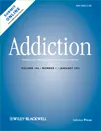| Titre : | Adolescent alcohol use: a reflection of national drinking patterns and policy? (2014) |
| Auteurs : | P. BENDTSEN ; M. T. DAMSGAARD ; T. HUCKLE ; S. CASSWELL ; E. KUNTSCHE ; P. ARNOLD ; M. DE LOOZE ; F. HOFMANN ; A. HUBLET ; B. SIMONS-MORTON ; T. F. M. ter BOGT ; B. E. HOLSTEIN |
| Type de document : | Article : Périodique |
| Dans : | Addiction (Vol.109, n°11, November 2014) |
| Article en page(s) : | 1857-1868 |
| Langues: | Anglais |
| Discipline : | EPI (Epidémiologie / Epidemiology) |
| Mots-clés : |
Thésaurus mots-clés HBSC ; ALCOOL ; ADOLESCENT ; POLITIQUE ; AGE MINIMUM LEGAL ; ADULTE ; TYPE D'USAGE ; IVRESSE ; ETUDE TRANSVERSALE ; SEXEThésaurus géographique INTERNATIONAL |
| Résumé : |
Aims: To analyse how adolescent drunkenness and frequency of drinking were associated with adult drinking patterns and alcohol control policies.
Design, Setting and Participants: Cross-sectional survey data on 13- and 15-year-olds in 37 countries who participated in the Health Behaviour in School-Aged Children (HBSC) Study in 2010 (n = 144 788) were linked to national-level indicators on alcohol control policies and adult drinking patterns. Measurements: Outcome measures were self-reported weekly drinking and life-time drunkenness (drunk once or more). Data were analysed using multi-level logistic regression models. Findings: In the mutually adjusted models, adolescent drunkenness was associated significantly with high adult alcohol consumption [odds ratio (OR) = 3.15 among boys, 95% confidence interval (CI) = 2.13-4.64, OR girls = 2.44, CI = 1.57-3.80] and risky drinking patterns in the adult population (OR boys = 2.02, CI = 1.33-3.05, OR girls = 1.61, CI = 1.18-2.18). The level of abstainers in the adult population was also associated significantly with girls' drunkenness; a 10% increase in the number of abstainers in a country reduced the odds of drunkenness with 21% (OR = 0.79, CI = 0.68-0.90). Weekly drinking was associated significantly with weak restrictions on availability (OR boys = 2.82, CI = 1.74-4.54, OR girls = 2.00, CI = 1.15-3.46) and advertising (OR boys = 1.56, CI = 1.02-2.40, OR girls = 1.79, CI = 1.10-2.94). Conclusions: Comparing data cross-nationally, high levels of adult alcohol consumption and limited alcohol control policies are associated with high levels of alcohol use among adolescents. |
| Domaine : | Alcool / Alcohol |
| Refs biblio. : | 56 |
| Affiliation : | National Institute of Public Health, University of Southern Denmark, Copenhagen, Denmark |
| Cote : | Abonnement |
 Accueil
Accueil



